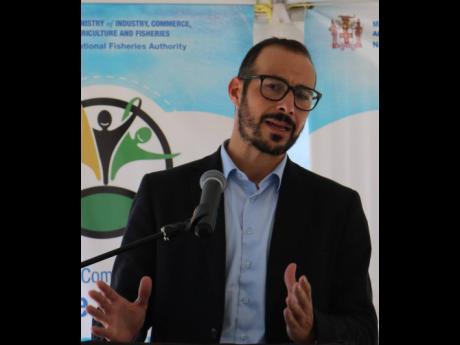Increased poverty looms - World Bank official says pandemic, climate change unleashing economic hardships
Extreme global poverty is projected to rise this year to unprecedented levels and Jamaica will be among the hardest hit countries, as the ongoing fallout caused by the coronavirus pandemic, combines with the impact of conflict and climate change for a deadly cocktail of economic woes.
This warning by resident World Bank representative to Jamaica, Ozan Sevimli, came during Thursday’s formal presentation of a maritime patrol and enforcement vessel which cost US$168,000 to the National Fisheries Authorities (formerly Fisheries Division) at the Royal Jamaica Yacht Club, Palisadoes, in Kingston.
“For the first time in over 20 years, extreme global poverty is expected to rise in 2020 as the disruption of the COVID-19 pandemic compounds with the forces of conflict and climate change.
“In Jamaica, we are seeing poverty rates increase as well due to the pandemic and the hardest hit communities are those that rely on the tourism, agriculture and fisheries sectors. Too many lives are being lost and livelihoods being devastated,” Sevimli warned.
On Tuesday, June 23, Finance and the Public Service Minister Dr Nigel Clarke announced in Parliament that Jamaica’s poverty rate had declined by 40 per cent to 12.6 per cent in 2018, representing the lowest percentage recorded in 10 years.
He said the decline could be attributed to an increase in real gross domestic product (GDP), a rise in employment, an uptick in some households receiving remittances, as well as a slowing in the rate of inflation. Citing the main factors accounting for the overall decline in poverty, Clarke said that in 2018, Jamaica’s economy recorded a GDP growth rate of 1.9 per cent and represented the highest economic growth since 2006.
And with the world eagerly anticipating a coronavirus vaccine, the World Bank representative had more bad news.
“There is no vaccine coming for climate change!” he told stakeholders in the local fisheries fraternity, going on to explain that the day’s event was a symbol of a larger effort by the World Bank and the Jamaican Government and its partners in putting the country on a climate-resilient pathway.
“The closest that we will get to a vaccine for climate change is to make the right investments today for a low carbon economy, investments in climate-resilient infrastructure, adopting climate-smart practices and technologies, as well as improving the governance and strengthening institutions.”

